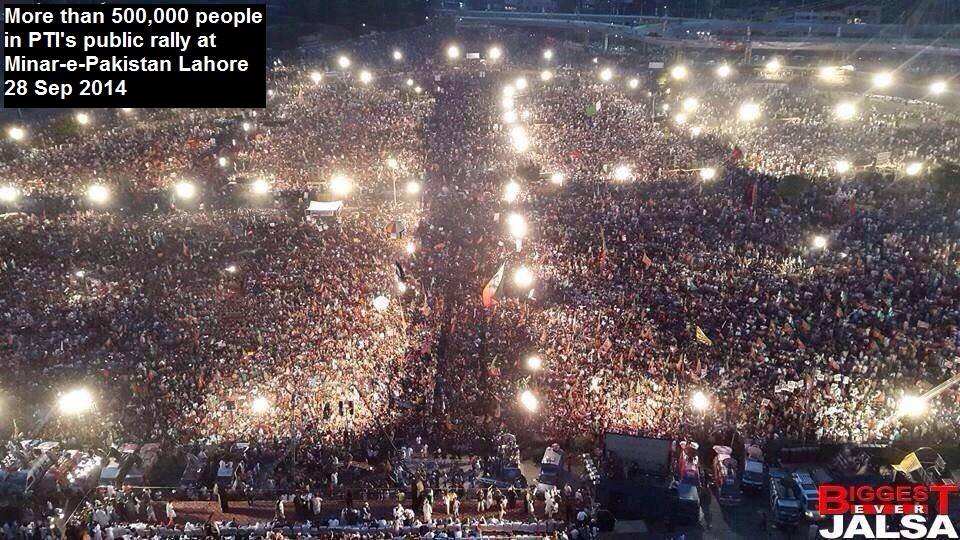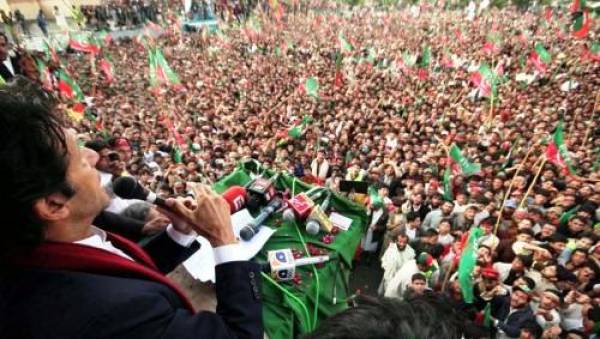Happy to be a part of the divide – by A Z
Imran Khan’s protests have taken on a whole new dimension. Even for someone who participated and made speeches as a fifteen-year old in 1977’s upheaval, this is an unprecedented experience. For a person who had never actively courted politics beyond its academic institution level and who has never cast his vote in any type of general election, I feel vigorously re-politicized. Certainly the situation in terms of both the speech being employed and the objectives being expressed by PTI’s protest movement are becoming progressively more intense and are creating a situation in which society is clearly becoming more and more divided down the middle. The great thing is that these PTI’s movements; they are quite personal and sociable affairs. They are not only about realizing political objectives, a lot of the time the people who are going on these protest movements are friends, they are meeting up with a larger body of people who are coming together in solidarity in their dismay with the political order in Pakistan. It is the first time that they are feeling a sense of commonality in large groups which of course is a very attractive thing. Those attending the mass protests of PTI enjoy a sense of solidarity. For the first time in the history of Pakistan, PTI has transformed political public meetings into congenial affairs where entire families turn up together to protest.
But the problem is that on electronic media and networks, the views that are being articulated by the activists are circulating widely and of course revealing that there are two distinct groups in the country who both have a very different view of the way in which they want to see the country going from here. What we have seen with the language on display in the parliament is a set of pretty distasteful opinions. Then, there is increasingly the language used to describe the current Prime Minister Nawaz Sharif which has become in many cases harsh and which Nawaz tries his utmost to deserve.
I always try and avoid talking politics and religion. It is always a risky business talking politics with friends and family who I love dearly and respect, because as human beings they hold different opinions to me. So I avoid delving too deep. But, these protests have challenged me, like me many others, to confront the political separation like never before. Like in 1977, people suddenly have to confront the fact that their partner or their parent or their best friend don’t have the same opinion about Imran Khan’s fight that they feel so strongly about. The divide, though, is much stronger than in 1977 because of the transparency, speed, and abundance of information. When this commonality, this camaraderie, this solidarity that they feel with this other group of people is no longer replicated within their own social setup, they genuinely find that very challenging. It has certainly led to friends falling out, relationships breaking down, to people feeling very isolated and feeling genuinely disturbed and upset about where Pakistan is heading. De-friending on Facebook is not uncommon –I have done a few for the sin of forgetting to use language that is appropriate- which only serves to further radicalize the opposing sides as they insulate each other further from listening to alternative views. As this battle develops, which is about the primary way in which Pakistan is governed, there is clear evidence of a divide forming. The situation that Pakistan is dealing with is that Imran Khan and his supporters are convinced that society has to change in an essential manner, where the constituency who decides who is going to be in power has to be fair and not out rightly rigged or skillfully manipulated and has to be bigger as more people need to be involved directly in the systems of government that affect their lives. Democracy has to be fair and transparent and has to devolve upon all levels through local bodies’ elections and elections within the political parties.
 Lately, Karachi’s and Lahore’s public meetings have been unprecedented in the history of the country in that no one has ever been able to pull such crowds at such short notices of just a week or less. These meetings show what Imran has already achieved. While the New Pakistan may yet not be in the making, Imran has exposed the Old Pakistan to its inhabitants and the majority of them hate what they see. And many of them are willing to repose their trust in a man who may not be a wily politician but who thinks what he wishes and speaks not to deceive or gain approval but to propagate and ventilate what he thinks. Facing him is Nawaz Sharif who upholds an elite-based national identity that is generally concerned with maintaining the consistency and the constituency of the elite classes represented by corrupt politicians, tycoons, and feudal lords. Nawaz is a man who is lingering in the past because that was the time when his style of politics ruled, the time when all outcomes to his liking could be manufactured.
Lately, Karachi’s and Lahore’s public meetings have been unprecedented in the history of the country in that no one has ever been able to pull such crowds at such short notices of just a week or less. These meetings show what Imran has already achieved. While the New Pakistan may yet not be in the making, Imran has exposed the Old Pakistan to its inhabitants and the majority of them hate what they see. And many of them are willing to repose their trust in a man who may not be a wily politician but who thinks what he wishes and speaks not to deceive or gain approval but to propagate and ventilate what he thinks. Facing him is Nawaz Sharif who upholds an elite-based national identity that is generally concerned with maintaining the consistency and the constituency of the elite classes represented by corrupt politicians, tycoons, and feudal lords. Nawaz is a man who is lingering in the past because that was the time when his style of politics ruled, the time when all outcomes to his liking could be manufactured.
The status quo that Nawaz represents is under threat and its beneficiaries are frenetically scrambling to save it. Yes, there are many people, including friends, who have placed themselves as observers, unencumbered by participants by the ropes and shouting. I have no idea how they are able to resist the urge to belong; yet, I feel that Pakistan is in the grip of a decisive moment, a moment to take sides. Need I say which side I am on? No, I won’t. But I do see Pakistan as a field getting ready for its early summer mowing.
Jan Achakzai(JUI) Giving Life Threats To Imran… by awaissamoo


A very simple summary of what has been in the minds of many within and outside Pakistan.Winds of revolution whistle from D-chowk a song I have not heard in decades.
http://www.youtube.com/watch?v=nun_AarKJlA
Asif Zaidi, I admire your idealism and starry-eyed enthusiasm. Just one reminder: During the time of Musharraf, a popular movement in support of a deposed chief justice, apparently initiated by the educated middle classes of Pakistan captured the media attention worldwide. Wise observers decreed that it was a new dawn for Pakistan. The educated middle class was taking charge. Things would not be the same again. What is left of that movement today and what impact did it have on the elections that followed? Pakistan’s problems unfortunately, are much more profound. I agree that one must keep one’s chin up and hope for the best. Some of us enjoy the privilege of possessing unfaltering hope in unlimited supply. The rest of us have doubts, reservations, concerns and a rather painful sense of reality. Here is an interesting article about how Pakistan thinks: http://www.dawn.com/news/1135310/pakistans-worst-nightmare-a-jew-an-indian-and-an-american-walk-into-a-bar